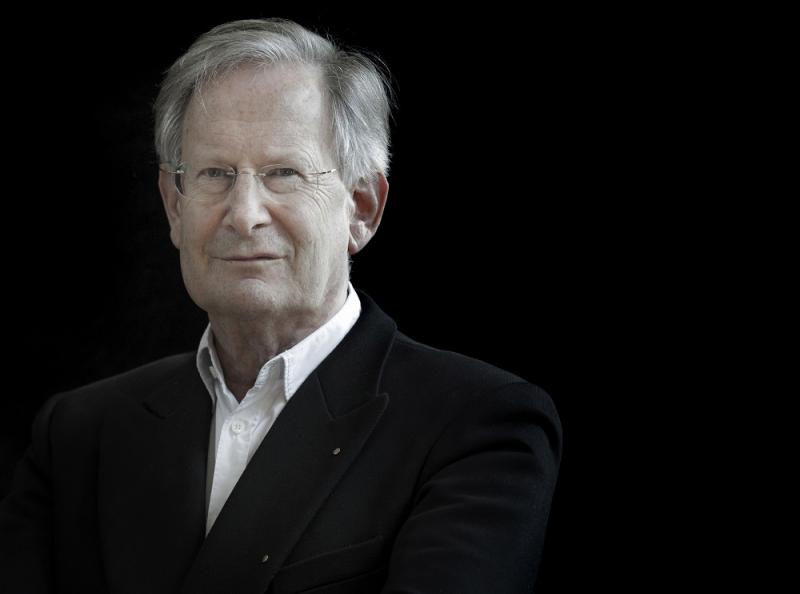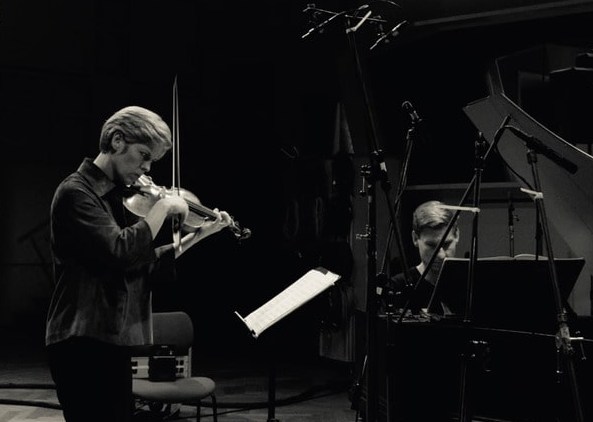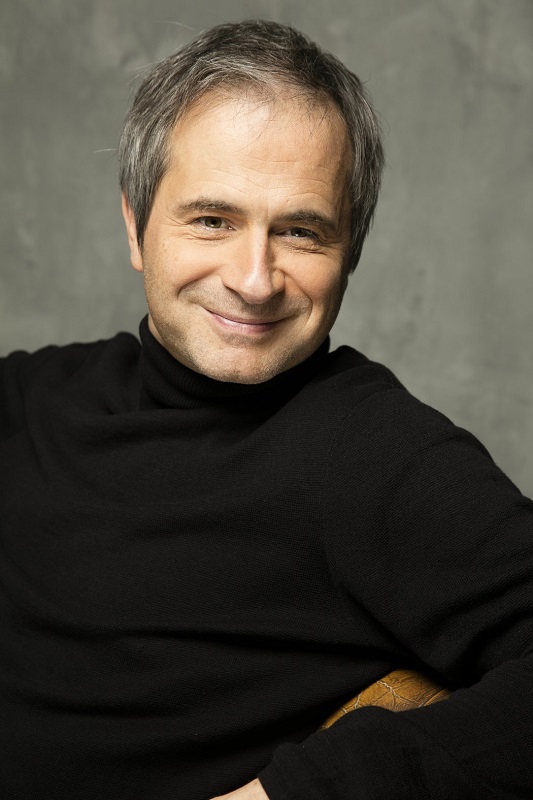Schumann Series 3 & 4, LSO, Gardiner, Barbican review - upstanding brilliance | reviews, news & interviews
Schumann Series 3 & 4, LSO, Gardiner, Barbican review - upstanding brilliance
Schumann Series 3 & 4, LSO, Gardiner, Barbican review - upstanding brilliance
Energetic symphonies cycle concludes, with top soloists in Mendelssohn and Beethoven

Schumann revitalized by John Eliot Gardiner and the London Symphony Orchestra last year left us wanting more: namely two of the four symphonies (transcendently great, as it turns out from these revelatory performances).
The extra energy and communication Gardiner gets from having all the players bar cellos, basses and timps standing – an idea expanded from Mendelssohn the conductor’s practice in Leipzig of keeping violins and violas on their feet – are never for a moment in doubt. We also heard how it gave a spark even more brilliant than usual to Berlioz’s Overture Le Corsaire in a Prom last summer with Gardiner’s period-instrument band, the Orchestre Révolutionnaire et Romantique. Thursday night’s opener, Weber’s Overture to Euryanthe, sounded oddly Berliozian in its dash, too. Then it was discretion time, the orchestra sitting for the first of the two concertos with the best possible soloists. Even at 14 Mendelssohn was straining at the leash, and his Concerto for Violin and Piano has big ambitions, even if it’s a relief that he condensed the forms of later works in the form.
 The first movement would stand as a fantasia by itself: there’s a very surprising moment where the violin takes off against piano tremolos. The rest is more Mozart than Beethoven, but with violinist Isabelle Faust and Kristian Bezuidenhout (pictured right recording for Harmonia Mundi) drawing lovely sounds from a mellow, mezzo-ish forepiano, the creativity was in the teamwork. Mendelssohn the boy wonder clearly got excited by arpeggios; with Bezuidenhout’s perfect timing, we could discover them afresh, too. Faust is for so many of us the perfect violinist – never forcing the sound, adjusting vibrato to the occasion, delightfully in tune with pianist, conductor and orchestra. This is not a work I’d especially want to sit through again in concert with any other soloists, but these two made total musical sense of it.
The first movement would stand as a fantasia by itself: there’s a very surprising moment where the violin takes off against piano tremolos. The rest is more Mozart than Beethoven, but with violinist Isabelle Faust and Kristian Bezuidenhout (pictured right recording for Harmonia Mundi) drawing lovely sounds from a mellow, mezzo-ish forepiano, the creativity was in the teamwork. Mendelssohn the boy wonder clearly got excited by arpeggios; with Bezuidenhout’s perfect timing, we could discover them afresh, too. Faust is for so many of us the perfect violinist – never forcing the sound, adjusting vibrato to the occasion, delightfully in tune with pianist, conductor and orchestra. This is not a work I’d especially want to sit through again in concert with any other soloists, but these two made total musical sense of it.
After that, the concision and originality of Schumann’s “Rhenish” Symphony really struck home. Unusual to have five movements, four of them almost divertimento-like, the bigger opening movement making the most of its bracing, forward-sweeping main theme and transforming it beautifully; we’re in E flat major, a key much favouring the horns since Beethoven’s “Eroica”; Gardiner and Schumann gave them their head, gloriously so. It was mostly rather loud in the treacherously magnifying space of the Barbican Hall, more so than in last year’s two instalments; understood, Gardiner wanted an earthier edge to the ensuing country waltz, but the grace of his ORR recording is somehow more beguiling. Full marks, though, to the delicacy of clarinets in the exquisite little intermezzo, the gone-too-soon feeling induced immediately after its subtle dissolve, the ensuing Bach-like sobriety of a ceremony in Cologne Cathedral, also much shorter and more compact than such rituals tend to be, the delight in the plunge back into the finale’s daylight.

The most ecstatic was saved for last: a perfectly sprung “Spring” Symphony, Schumann's pulsing rhythms so bracingly defined, the melodies singing out (especially the lovely one introduced by the oboe as counterpoint in the first-movement development). Gardiner’s vivid continuity was a virtue in the scherzo with two trios, and violins took advantage of being on their feet to trip the light fantastic in that loving finale (none other, surely, has the marking Allegro animato e grazioso). Nor was it any hardship to sit through the Mendelssohn scherzo again. The main thing, though, is that Gardiner has taken us through the Schumann symphonies as I never heard them before, made us marvel at all their extra generosities of idea and – yes – vindicated his assertion that Schumann was, contrary to the dreary cliché that he couldn’t orchestrate, a master of instrumental means to ends.
rating
Share this article
The future of Arts Journalism
You can stop theartsdesk.com closing!
We urgently need financing to survive. Our fundraising drive has thus far raised £49,000 but we need to reach £100,000 or we will be forced to close. Please contribute here: https://gofund.me/c3f6033d
And if you can forward this information to anyone who might assist, we’d be grateful.

Subscribe to theartsdesk.com
Thank you for continuing to read our work on theartsdesk.com. For unlimited access to every article in its entirety, including our archive of more than 15,000 pieces, we're asking for £5 per month or £40 per year. We feel it's a very good deal, and hope you do too.
To take a subscription now simply click here.
And if you're looking for that extra gift for a friend or family member, why not treat them to a theartsdesk.com gift subscription?
more Classical music
 BBC Proms: Láng, Cser, Budapest Festival Orchestra, Ivan Fischer review - idiomatic inflections
Bartók’s heart of darkness follows Beethoven’s dancing light
BBC Proms: Láng, Cser, Budapest Festival Orchestra, Ivan Fischer review - idiomatic inflections
Bartók’s heart of darkness follows Beethoven’s dancing light
 Weilerstein, NYO2, Payare / Dueñas, Malofeev, Edinburgh International Festival 2025 review - youthful energy and emotional intensity
Big-boned Prokofiev and Shostakovich, cacophonous López, plus intense violin/piano duo
Weilerstein, NYO2, Payare / Dueñas, Malofeev, Edinburgh International Festival 2025 review - youthful energy and emotional intensity
Big-boned Prokofiev and Shostakovich, cacophonous López, plus intense violin/piano duo
 theartsdesk at the Three Choirs Festival - Passion in the Cathedral
Cantatas new and old, slate quarries to Calvary
theartsdesk at the Three Choirs Festival - Passion in the Cathedral
Cantatas new and old, slate quarries to Calvary
 BBC Proms: Estonian Philharmonic Chamber Choir, Kaljuste review - Arvo Pärt 90th birthday tribute
Stillness and contemplation characterise this well sung late-nighter
BBC Proms: Estonian Philharmonic Chamber Choir, Kaljuste review - Arvo Pärt 90th birthday tribute
Stillness and contemplation characterise this well sung late-nighter
 BBC Proms: Kholodenko, BBCNOW, Otaka review - exhilarating Lutosławski, underwhelming Rachmaninov
Polish composers to the fore in veteran conductor’s farewell
BBC Proms: Kholodenko, BBCNOW, Otaka review - exhilarating Lutosławski, underwhelming Rachmaninov
Polish composers to the fore in veteran conductor’s farewell
 theartsdesk at the Pärnu Music Festival 2025 - Arvo Pärt at 90 flanked by lightness and warmth
Paavo Järvi’s Estonian Festival Orchestra still casts its familiar spell
theartsdesk at the Pärnu Music Festival 2025 - Arvo Pärt at 90 flanked by lightness and warmth
Paavo Järvi’s Estonian Festival Orchestra still casts its familiar spell
 BBC Proms: Batsashvili, BBC Scottish Symphony Orchestra, Ryan Wigglesworth review - grief and glory
Subdued Mozart yields to blazing Bruckner
BBC Proms: Batsashvili, BBC Scottish Symphony Orchestra, Ryan Wigglesworth review - grief and glory
Subdued Mozart yields to blazing Bruckner
 Classical CDs: Hens, Hamburg and handmaids
An unsung French conductor boxed up, plus Argentinian string quartets and baroque keyboard music
Classical CDs: Hens, Hamburg and handmaids
An unsung French conductor boxed up, plus Argentinian string quartets and baroque keyboard music
 BBC Proms: McCarthy, Bournemouth SO, Wigglesworth review - spring-heeled variety
A Ravel concerto and a Walton symphony with depth but huge entertainment value
BBC Proms: McCarthy, Bournemouth SO, Wigglesworth review - spring-heeled variety
A Ravel concerto and a Walton symphony with depth but huge entertainment value
 BBC Proms: First Night, Batiashvili, BBCSO, Oramo review - glorious Vaughan Williams
Spirited festival opener is crowned with little-heard choral epic
BBC Proms: First Night, Batiashvili, BBCSO, Oramo review - glorious Vaughan Williams
Spirited festival opener is crowned with little-heard choral epic
 Interview: Quinteto Astor Piazzolla on playing in London and why Mick Jagger's a fan
Music Director Julián Vat and pianist Matias Feigin compare notes on Piazzolla
Interview: Quinteto Astor Piazzolla on playing in London and why Mick Jagger's a fan
Music Director Julián Vat and pianist Matias Feigin compare notes on Piazzolla

Add comment